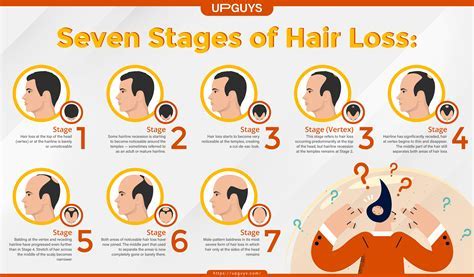Hair loss is a common concern for both men and women. While there are many potential causes of hair loss, one of the most common is male-pattern baldness (MPB). MPB is a genetic condition that causes hair follicles to shrink and eventually stop producing hair.

There are a number of treatments for MPB, including medications, surgery, and laser therapy. However, there is no cure for MPB, and all treatments are only partially effective.
One common myth about hair loss is that shaving your hair will make it grow back thicker and fuller. However, there is no scientific evidence to support this claim. In fact, shaving your hair may actually make it appear thinner and less full.
This is because shaving removes the tapered ends of the hair shafts, which makes the hair appear blunt and stubbly. Additionally, shaving can irritate the scalp, which can lead to inflammation and hair loss.
If you are concerned about hair loss, it is important to see a dermatologist to determine the cause and discuss treatment options.
There are many potential causes of hair loss, including:
- Genetics: MPB is the most common cause of hair loss in men. It is a genetic condition that causes hair follicles to shrink and eventually stop producing hair.
- Hormones: Changes in hormone levels can also lead to hair loss. For example, hair loss is common in women after childbirth or menopause.
- Medications: Certain medications, such as chemotherapy drugs and blood thinners, can cause hair loss as a side effect.
- Medical conditions: Some medical conditions, such as thyroid disease and lupus, can also lead to hair loss.
- Stress: Severe stress can trigger hair loss.
- Styling practices: Tight hairstyles, such as cornrows and braids, can put stress on hair follicles and lead to hair loss.
- Diet: A diet that is deficient in certain nutrients, such as iron and protein, can also lead to hair loss.
There is no surefire way to prevent hair loss, but there are a number of things you can do to reduce your risk, including:
- Maintain a healthy diet: Eating a healthy diet that is rich in fruits, vegetables, and whole grains can help to ensure that you are getting all of the nutrients that your hair needs.
- Manage stress: Stress can be a major trigger for hair loss. Find healthy ways to manage stress, such as exercise, yoga, or meditation.
- Avoid tight hairstyles: Tight hairstyles, such as cornrows and braids, can put stress on hair follicles and lead to hair loss.
- Use gentle hair care products: Harsh hair care products can damage hair and lead to hair loss. Use gentle shampoos and conditioners, and avoid using hot styling tools.
- See a dermatologist: If you are concerned about hair loss, see a dermatologist to determine the cause and discuss treatment options.
There are a number of treatments for hair loss, including:
- Medications: There are a number of medications that can be used to treat hair loss, including minoxidil and finasteride. These medications work by either slowing down hair loss or stimulating hair growth.
- Surgery: Hair transplant surgery is a procedure in which hair follicles are taken from a donor area and transplanted to the balding area.
- Laser therapy: Laser therapy is a non-invasive procedure that uses low-level lasers to stimulate hair growth.
Hair loss is a common concern, but there are a number of things you can do to reduce your risk and treat hair loss. If you are concerned about hair loss, see a dermatologist to determine the cause and discuss treatment options.
- Can shaving your hair make it grow back thicker?
No, there is no scientific evidence to support this claim. In fact, shaving your hair may actually make it appear thinner and less full.
- What is the most common cause of hair loss in men?
MPB is the most common cause of hair loss in men. It is a genetic condition that causes hair follicles to shrink and eventually stop producing hair.
- What are the treatment options for hair loss?
There are a number of treatments for hair loss, including medications, surgery, and laser therapy.
- Can hair loss be prevented?
There is no surefire way to prevent hair loss, but there are a number of things you can do to reduce your risk, including maintaining a healthy diet, managing stress, and avoiding tight hairstyles.
- What is the best way to treat hair loss?
The best way to treat hair loss is to see a dermatologist to determine the cause and discuss treatment options.
- How much does hair transplant surgery cost?
The cost of hair transplant surgery varies depending on the number of grafts needed and the surgeon’s experience. However, the average cost is between $4,000 and $15,000.
- Does laser therapy work for hair loss?
Laser therapy is a non-invasive procedure that uses low-level lasers to stimulate hair growth. However, the results of laser therapy vary from person to person.
- Is there a cure for hair loss?
There is no cure for hair loss, but all treatments are only partially effective.
